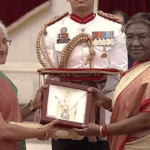On World Water Day, NABARD and its NBFC subsidiary NABSAMRUDDHI launched a nationwide Climate Ready Water, Sanitation, and Hygiene (WASH) funding awareness campaign. The campaign targets women Joint Liability Group (JLG) borrowers of Micro Finance Institutions (MFIs) to support sustainable rural development. This article delves into the details of this initiative and its significance in fostering rural development and climate resilience.
World Water Day and Sustainable Rural Development
World Water Day, observed on March 22, serves as a reminder of the importance of freshwater and the sustainable management of water resources. In the context of rural development, access to clean water and sanitation is crucial for enhancing livelihoods and ensuring the well-being of communities, particularly in the face of climate change.
Also Read https://yadfarm.com/nabards-state-credit-seminar-rajasthan/
Highlights from the NABARD Campaign Launch Event
The campaign’s first phase was inaugurated at NABARD Mumbai, with Shaji K.V., Chairman of NABARD, emphasizing the critical need for water availability, especially for marginalized communities. He highlighted the impact of climate change on water resources and livelihoods, emphasizing the importance of impactful solutions over financial returns.
NABSAMRUDDHI, NABARD’s subsidiary, has been providing concessional wholesale WASH loans to support sustainable livelihoods. The campaign aims to create awareness among end borrowers, with a focus on women borrowers, who constitute 90% of the beneficiaries.
Details of the Awareness Campaign
The campaign will cover 40 block-level camps in climate-vulnerable areas across 7 states in its first phase. It includes exposure visits for stakeholders and the sanctioning of term loans. The campaign is supported by FINISH Mondial, a partner organization.
Stakeholder Involvement and Support
The event saw the participation of various stakeholders, including Panchayati Raj Institutions, Civil Society Organizations, Government agencies, and technical partners like Water.org and FINISH Mondial. Their support is crucial for the success and impact of the campaign.
Financing Solutions and Products Covered
The campaign focuses on financing climate-resilient solutions such as climate-smart toilets, rainwater harvesting for borewell recharge and storage, and solarization of pumps. These solutions are aimed at mitigating the impact of climate change on water resources and sanitation.

Img Src:-Krishijagaran.com
Collaborative Efforts and Partnerships
NABSAMRUDDHI has collaborated with various organizations, including Water.org, GIZ, and Sa-dhan, to implement the campaign effectively. A memorandum of understanding (MOU) was also signed with Climate Policy Initiative (CPI) to collaborate on financing climate-smart solutions.
Addressing the Adverse Impact of Climate Change
The campaign addresses the adverse impact of climate change on safe water and sanitation, which is manifested through droughts, floods, melting glaciers, cyclones, and rising sea levels. Financing such solutions is expected to mitigate climate risks and improve the quality of life for rural women.
Read The Similar Articles
In conclusion, NABARD and NABSAMRUDDHI’s Climate Ready WASH funding awareness campaign is a significant step towards sustainable rural development. By focusing on climate-resilient solutions and creating awareness among stakeholders, the campaign aims to address the challenges posed by climate change and ensure a better future for rural communities.
Click Here For more Latest Information
FAQs
- What is NABARD’s role in rural development? NABARD, as a public finance institution, focuses on supporting sustainable rural development through innovative solutions and partnerships.
- How does NABSAMRUDDHI support sustainable livelihoods? NABSAMRUDDHI provides concessional wholesale WASH loans to support climate-resilient solutions and enhance livelihoods.
- What are some of the climate-resilient solutions covered under the campaign? The campaign covers financing for climate-smart toilets, rainwater harvesting, and solarization of pumps, among others.
- Why is gender equity important in the context of WASH funding? Gender equity is crucial as women are often disproportionately affected by the lack of access to clean water and sanitation.
- How can individuals contribute to promoting sustainable rural development? Individuals can contribute by raising awareness, adopting sustainable practices, and supporting initiatives that focus on climate resilience and rural development.










